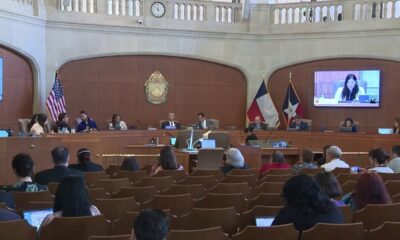News from the South - Alabama News Feed
Election officials blast Trump’s ‘retreat’ from protecting voting against foreign threats
Election officials blast Trump’s ‘retreat’ from protecting voting against foreign threats
by Matt Vasilogambros, Alabama Reflector
February 22, 2025
The Trump administration has begun dismantling the nation’s defenses against foreign interference in voting, a sweeping retreat that has alarmed state and local election officials.
The administration is shuttering the FBI’s Foreign Influence Task Force and last week cut more than 100 positions at the U.S. Cybersecurity and Infrastructure Security Agency. President Donald Trump signed the law creating the agency in 2018. Among its goals is helping state and local officials protect voting systems.
Secretaries of state and municipal clerks fear those moves could expose voter registration databases and other critical election systems to hacking — and put the lives of election officials at risk.
GET THE MORNING HEADLINES.
In Pennsylvania, Republican Secretary of the Commonwealth Al Schmidt said states need federal help to safeguard elections from foreign and domestic bad actors.
“It is foolish and inefficient to think that states should each pursue this on their own,” he told Stateline. “The adversaries that we might encounter in Pennsylvania are very likely the same ones they’ll encounter in Michigan and Georgia and Arizona.”
Officials from the Cybersecurity and Infrastructure Security Agency, known as CISA, and other federal agencies were notably absent from the National Association of Secretaries of State winter meeting in Washington, D.C., earlier this month. Those same federal partners have for the past seven years provided hacking testing of election systems, evaluated the physical security of election offices, and conducted exercises to prepare local officials for Election Day crises, among other services for states that wanted them.
But the Trump administration thinks those services have gone too far.
In a Feb. 5 memo, U.S. Attorney General Pam Bondi said the administration is dismantling the FBI’s task force “to free resources to address more pressing priorities, and end risks of further weaponization and abuses of prosecutorial discretion.” The task force was launched in 2017 by then-FBI Director Christopher Wray, a Trump nominee.
In her confirmation hearing last month, Homeland Security Secretary Kristi Noem said CISA has “gotten far off-mission.” She added, “They’re using their resources in ways that was never intended.” While the agency should protect the nation’s critical infrastructure, its work combating disinformation was a step too far, she said.
This echoes the language from the conservative Heritage Foundation’s Project 2025 document, which has driven much of the Trump administration’s policies. “The Left has weaponized [CISA] to censor speech and affect elections at the expense of securing the cyber domain and critical infrastructure,” it says.
But there is a direct correlation between pervasive election disinformation and political violence, election officials warn.
Federal officials led the investigations into the roughly 20 death threats that Colorado Democratic Secretary of State Jena Griswold has received over the past 18 months, Griswold said. Federal and Colorado officials also collaborated on social media disinformation and mass phishing scams.
“Trump is making it easier for foreign adversaries to attack our elections and our democracy,” Griswold said in an interview. “He incites all this violence, he has attacked our election system, and now he is using the federal government to weaken us.”
Colorado could turn to private vendors to, for example, probe systems to look for weaknesses, she said. But the state would be hard-pressed to duplicate the training, testing and intelligence of its federal partners.
Some election leaders aren’t worried, however.
“Kentucky has no scheduled elections in 2025, and we have no immediate concerns pending reorganization of this agency,” Republican Secretary of State Michael Adams told Stateline in an email.
Elections under attack
Since the Russian government interfered in the 2016 presidential campaign, the federal government has recognized that it overlooked security risks in the election system, said Derek Tisler, a counsel in the Elections and Government Program at the Brennan Center, a left-leaning pro-democracy institute.
Further, he said, the feds realized that election officials working in 10,000 local offices could not be frontline national security experts. On their own, local officials are incapable of addressing bigger security risks or spotting a coordinated attack across several states, Tisler said.
Much of the federal expertise and training came through CISA, Tisler said.
“Foreign interferers are not generally looking to interfere in Illinois’ elections or in Texas’ elections; they are looking to interfere in American elections,” he said. “A threat anywhere impacts all states. It’s important that information is not confined to state lines.”
During November’s presidential election, polling places in several states received bomb threats that were traced back to Russia. Ballot drop boxes in Oregon and Washington were lit on fire, and videos falsely depicting election workers destroying ballots circulated widely.
The fact that these attacks have not had a meaningful impact on the outcomes of elections may be due to the amount of preparation and training that came from federal assistance in recent years, said Maine Secretary of State Shenna Bellows, a Democrat.
Indeed, the right-leaning Foundation for Defense of Democracies praised the collaboration between federal and state and local partners on election security for dampening the impact of foreign interference in the presidential election, finding that adversaries did not “significantly” influence the results.
I am deeply concerned that what is happening is actually gutting the election security infrastructure that exists.
– Maine Democratic Secretary of State Shenna Bellows
When Bellows took office in 2021, federal national security officials led state officials in emergency response training. After Bellows completed the training, she insisted that her state’s clerks, local emergency responders and law enforcement officers participate as well.
In addition, Maine coordinated with the FBI to provide de-escalation training to local clerks, to teach them how to prevent situations, such as a disruption from a belligerent voter, from getting out of hand. In 2022, CISA officials traveled to towns and cities across the state to assess the physical security of polling places and clerks’ offices.
Bellows said she’s most grateful for the federal help she got last year when she received a deluge of death threats, members of her family were doxed, and her home was swatted.
“I am deeply concerned that what is happening is actually gutting the election security infrastructure that exists and a tremendous amount of knowledge and expertise in the name of this political fight,” she told Stateline.
In Ingham County, Michigan, Clerk Barb Byrum last year invited two federal officials to come to her courthouse office southeast of Lansing to assess its physical security. Byrum got county funding to make improvements, including adding security cameras and a ballistic film on the windows of her office.
“The federal support is going to be missed,” she said. “It seems as though the Trump administration is doing everything it can to encourage foreign interference in our elections. We must remain vigilant.”
Scott McDonell, clerk for Dane County, Wisconsin, used to talk to Department of Homeland Security officials frequently to identify cybersecurity threats, including vulnerabilities in certain software or alerts about other attacks throughout the country. Losing that support could incentivize more interference, he said.
“I think it’s a terrible idea,” he said. “How can you expect someone like me, here in Dane County, to be able to deal with something like that?”
States fill the gap
Local election officials are nervous and uncertain about the federal election security cuts, said Pamela Smith, president and CEO of Verified Voting, a nonprofit that works with state and local election officials to keep voting systems secure.
The threat landscape for elections is “extreme,” she said. And even though it’s not a major election year, quieter times are when election offices can prepare and perfect their practices, she said.
“It is a retreat and it’s a really ill-advised one,” she said. “It’s a little bit like saying the bank has a slow day on Tuesday, we’re going to let our security guards go home.”
With a federal exodus, there will be a real need for states to offer these sorts of programs and assistance, said Tammy Patrick, chief programs officer at the National Association of Election Officials, which trains and supports local officials.
“There’s going to be a big gap there for the states to try and fill,” she said. “Some of them might be sophisticated enough to be able to do some of it, but I think there’s going to be some real disparate application across the country of who’s going to be able to fill in those gaps.”
Bill Ekblad, Minnesota’s election security navigator, has leaned on the feds to learn the ropes of election security and potential threats, help him assist local election offices with better cyber practices and keep officials throughout the state updated with the latest phishing attempts.
He finds it disheartening to see the federal government stepping back, and worries that he won’t have access to intelligence about foreign threats. But after five years of working with the federal government, he is hopeful that his state has built resiliency.
“We have come a long way,” he said. “We will be able to move forward with or without the partnerships we’ve enjoyed in the past.”
Stateline is part of States Newsroom, a nonprofit news network supported by grants and a coalition of donors as a 501c(3) public charity. Stateline maintains editorial independence. Contact Editor Scott S. Greenberger for questions: info@stateline.org.
YOU MAKE OUR WORK POSSIBLE.
Alabama Reflector is part of States Newsroom, a nonprofit news network supported by grants and a coalition of donors as a 501c(3) public charity. Alabama Reflector maintains editorial independence. Contact Editor Brian Lyman for questions: info@alabamareflector.com.
The post Election officials blast Trump’s ‘retreat’ from protecting voting against foreign threats appeared first on alabamareflector.com
News from the South - Alabama News Feed
Alabama immigration enforcement bill gets approval from 2nd House committee
by Ralph Chapoco, Alabama Reflector
April 3, 2025
An Alabama House committee Wednesday approved an immigration bill that had already received another committee’s approval earlier in the session.
The House Judiciary Committee approved HB 7, sponsored by Rep. Ernie Yarbrough, R-Trinity, which would give local law enforcement the authority to enforce the country’s immigration laws.
“There are no new laws added,” Yarbrough said to committee members during the meeting. “It simply allows that partnership to take place just to address safety in our communities.”
GET THE MORNING HEADLINES.
Judiciary approved the bill about six weeks after the House Public Safety and Homeland Security did so in February. It is unusual for a bill to go through two committees before going to the floor of the House for a vote. The last major legislation to get routed through two House committees was the bill legalizing medical cannabis in Alabama in 2021.
The current bill, largely unchanged from last year, allows local law enforcement, such as sheriff’s offices and police departments, to enter into agreements with federal agencies to arrest and detain people who are not legally authorized to reside in the country.
Once in custody, deputies and police officers must then attempt to determine a person’s immigration status and get the help of an interpreter to determine someone’s nationality.
If a person cannot provide documentation proving they are eligible to live in the country, local law enforcement may then reach out to a Law Enforcement Support Center (LESC) to get information about a person’s immigration status.
The bill states that people cannot be detained solely because of their immigration status unless authorized by Immigration and Customs Enforcement, and that sheriffs’ deputies and police departments will verify that a person has an arrest warrant within 24 hours of the person getting detained.
Law enforcement must also obtain documents to verify a person’s immigration status, bet that a passport or a permanent resident card.
House Judiciary Committee members approved an amendment making a few of the requirements optional. A previous version required the Alabama Attorney General’s Office to publicly name any agency failing to comply with provisions in the legislation and notify the governor’s office.
The updated language gives the AG’s Office an option to inform the Governor’s Office.
Another amendment also allows, but doesn’t require, local law enforcement to report the total number of people arrested and the number of foreign nationals they take into custody as well as the inquiries they make to the LESC.
Immigration advocates who spoke at a public hearing on the legislation in March said the legislation is creating fear among immigrant communities. That, they said, would lead to mistrust toward law enforcement and increased school truancy for children of immigrants who are afraid to attend school for fear of their parents being deported.
Democrats on the House Judiciary Committee criticized the legislation.
“What country do we border in Alabama?” asked Rep. Penni McClammy, D-Montgomery during the committee meeting Wednesday.
Yarbrough said that every state is connected, and that people travel.
“Each state doesn’t have a physical wall, so people travel from state to state,” Yarbrough said.
YOU MAKE OUR WORK POSSIBLE.
Alabama Reflector is part of States Newsroom, a nonprofit news network supported by grants and a coalition of donors as a 501c(3) public charity. Alabama Reflector maintains editorial independence. Contact Editor Brian Lyman for questions: info@alabamareflector.com.
The post Alabama immigration enforcement bill gets approval from 2nd House committee appeared first on alabamareflector.com
News from the South - Alabama News Feed
New Tariffs Could Raise Car Prices | April 2, 2025 | News 19 at 10 p.m.
SUMMARY: A 25% tariff on foreign cars and auto parts is set to take effect at midnight, potentially raising prices for consumers. While current inventory and cars already at U.S. ports will remain at existing prices, future pricing remains uncertain. Dealerships in North Alabama say it’s too early to know the full impact, but warn that repair costs may also rise due to higher parts prices. Some manufacturers may absorb part of the tariff, while others could pass the full cost to buyers—raising a $30,000 car to nearly $40,000. Dealerships report a recent surge in buyers trying to purchase before prices rise.

A 25% tariff on any foreign cars or auto parts will go into effect in a couple of hours.
News 19 is North Alabama’s News Leader! We are the CBS affiliate in North Alabama and the Tennessee Valley since November 28, 1963.
https://whnt.com/
https://www.facebook.com/whntnews19
https://www.instagram.com/whntnews19/
https://twitter.com/whnt
News from the South - Alabama News Feed
Weather Fun 1on1: Brylee explains why thunderstorms occur more often in the summer than in the wi…
SUMMARY: Meteorologist Brylee Brown explains why thunderstorms are more common in summer than winter in her “Weather Fun 1-on-1” segment. Joined by Aidan, they conduct an experiment using two bowls of air at different temperatures. The warm air inflates a balloon, demonstrating that warm air is less dense and rises, while cold air causes the balloon to deflate. This principle helps explain why summer afternoons often bring air mass thunderstorms, as humid, warm air is abundant. In winter, less warm air means these storms are rare. For more weather science resources, viewers can scan a QR code or visit the website.

Weather Fun 1on1: Brylee explains why thunderstorms occur more often in the summer than in the winter
Subscribe to WVTM on YouTube now for more: https://bit.ly/2jvAaUD
Get more Birmingham news: http://www.wvtm13.com
Like us: https://www.facebook.com/WVTM13/
Follow us: https://twitter.com/WVTM13
Instagram: https://www.instagram.com/wvtm13/
-

 Mississippi Today1 day ago
Mississippi Today1 day agoPharmacy benefit manager reform likely dead
-

 News from the South - Alabama News Feed7 days ago
News from the South - Alabama News Feed7 days agoSevere storms will impact Alabama this weekend. Damaging winds, hail, and a tornado threat are al…
-

 News from the South - Alabama News Feed6 days ago
News from the South - Alabama News Feed6 days agoUniversity of Alabama student detained by ICE moved to Louisiana
-

 News from the South - Oklahoma News Feed5 days ago
News from the South - Oklahoma News Feed5 days agoTornado watch, severe thunderstorm warnings issued for Oklahoma
-

 News from the South - Virginia News Feed6 days ago
News from the South - Virginia News Feed6 days agoYoungkin removes Ellis, appoints Cuccinelli to UVa board | Virginia
-

 News from the South - Kentucky News Feed7 days ago
News from the South - Kentucky News Feed7 days agoA little early morning putting at the PGA Tour Superstore
-

 News from the South - Georgia News Feed5 days ago
News from the South - Georgia News Feed5 days agoGeorgia road project forcing homeowners out | FOX 5 News
-

 News from the South - West Virginia News Feed6 days ago
News from the South - West Virginia News Feed6 days agoHometown Hero | Restaurant owner serves up hope








































